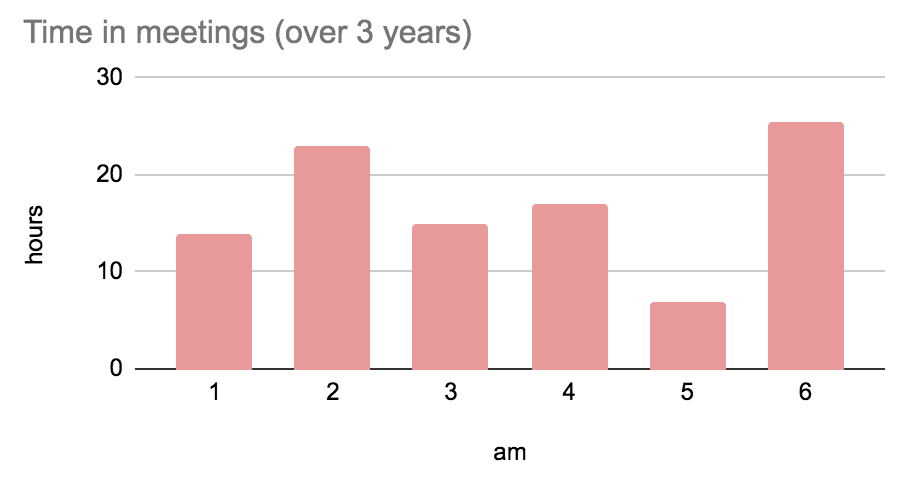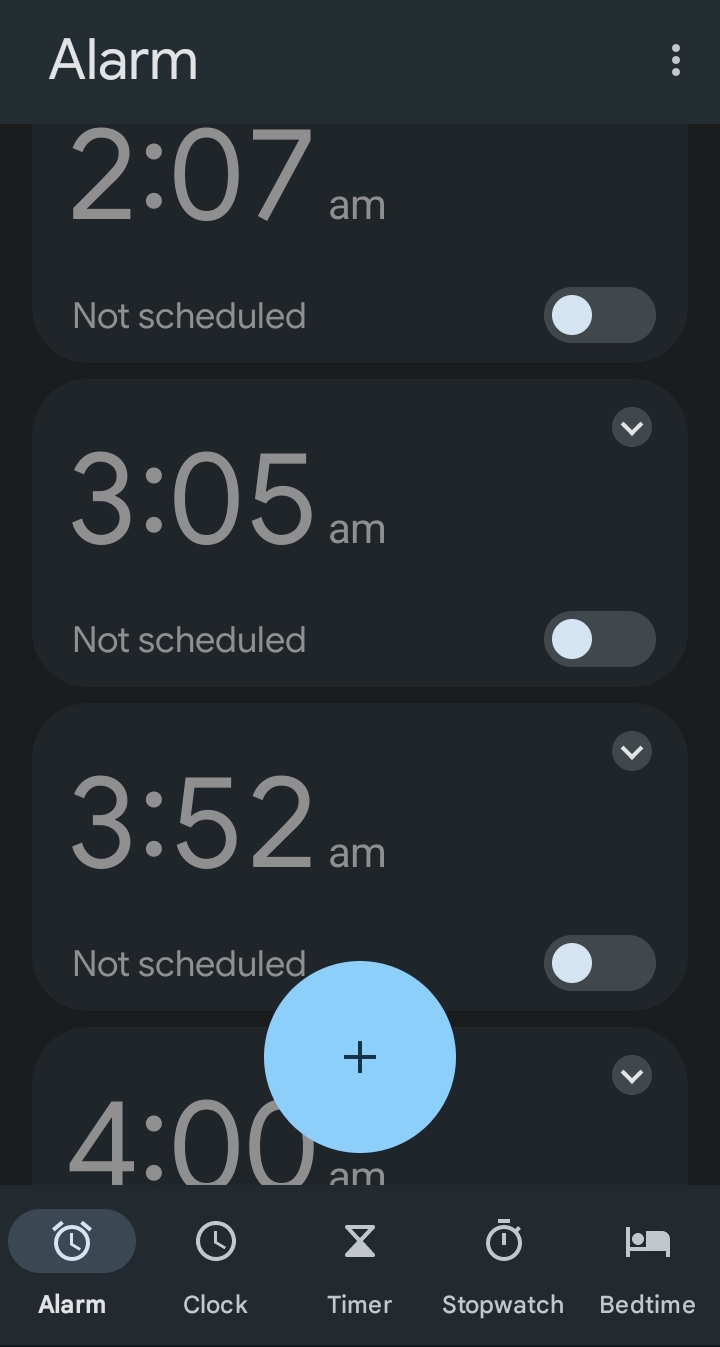In the last 3 years I've attended 77 meetings that began between 1am and 6am, roughly once every two weeks, followed by my usual 7am start, Monday to Saturday. I'm working remotely from Australia for a US firm (Intel) who does not have a local office here. I'm not complaining. I work weird hours, but I don't think I work too many. I'm writing this post because there are some misconceptions and assumptions about the lives of remote workers, and I thought I'd share my own details as an anecdote, along with some tips for others in a similar situation (US job from Asia).
Most early meetings were 1 hour, but some were longer, for a total of 102 hours awake. As a histogram:

I've never been a morning person, but I can manage a 7am start. What about a 2am meeting? Also doable. They sound ok in isolation, but consider that every 2-3am is followed by a 7am start, which means a 6:30am alarm after going back to sleep at 3:30am, if you're lucky. It's not easy working this timezone difference, and I'd guess others have it even worse than I do (more meetings).
Like other remote staff I work with, I have a dedicated office at home where I can close the door and work uninterrupted for hours (it's changed quite a bit since it was filmed in the eBPF documentary):

That's a Samson Meteor mic on a desktop suspension boom, and I have another suspension boom clamped onto a bookcase holding a Logitech BRIO camera (when I had it sitting on my monitor it'd shake as I typed). It's important to have the best sound and video when that's how you're interacting with people all day.
Miscellaneous notes and tips about remote work:
Count out-of-hours meetings. Sometimes people hesitate to book me at 2am, when there's no other time that would work, and it takes a few emails to convince them that it's ok. I've found it saves time to log these meetings, count them, and share stats: "I've had 76 meetings between 1am and 6am, if you need to add another, that's ok, it'll be my 77th."
Never complain about the hours. There may be someone in management who doesn't support remote work, who could use such complains to argue against it. Sometimes, when I'm searching to find the right words to say at 4-something-am, I've confessed that I'm a bit tired, but I really try to never mention it.
Staying motivated. I found keeping a daily log of what I accomplished works best (I've done this for over a decade). If one day my entry looks soft, I try to do more on the next. I summarize each week for my manager.
People assume it's a problem when it isn't. Brendan didn't accept the meeting, oh, it's because it's 2am for him and he'll be asleep. Wrong! It's because I have a clash with another 2am meeting. I try to communicate this with the meeting host, but there can be others in the meeting that don't get the message, and they never consider this possibility. If I were back in California I'd still miss the meeting, but people would assume it's due to a clash. Here, they assume I'm asleep and not making the effort, when in fact I am. It means people are assuming that remote work is a problem when it isn't.
Some meetings get cancelled or silently recorded. The 77 count I mentioned earlier doesn't include the several meetings that were cancelled at the last minute, but I woke up for anyway, or those that weren't supposed to be recorded but I woke up to find they were. If you have remote staff, please try to cancel meetings before they go to bed, and be clear on which meetings are recorded for later viewing.
Upset stomaches. One early meeting every two weeks doesn't sound too bad. The worst problem is that it can leave me with an upset stomach that can last for days. I'm still working fine, it's just uncomfortable. I don't know if other people suffer this or why it happens. Maybe it's just the extra coffee.
Fewer sick days. I don't normally take many sick days, so I can't say my data is very significant. FWIW: In my last in-person job I averaged 1.5 sick days/year (9 in 6 years), and now it's 0.33 (1 in 3 years).
Northen/Southern hemisphere times get weird. Daylight savings moves in different directions and on different dates, so from Sydney depending on the time of year I have 3, 4, or 5 hours of overlap with 9-5pm on the US west coast. To make it easy for people I setup my calendar with my work hours highlighted.
Saturday? Saturday morning is Friday afternoon in the US. For a while I tried working Tuesday to Saturday, but it's better for family time if I finish early on Saturday (at US 5pm) and work Monday to make up the difference.

Phone alarms
Career limiting I've experienced it to be career limiting, and I've heard the saying "out of sight, out of mind." Opportunities can be given to local workers despite the remote worker being more qualified, or even number one in the world in that area. The remote worker is then expected to teach the local worker in weekly or monthly meetings. It's not enough time and there's a power imbalance: the local worker is in charge and doesn't have to listen. This reduces company competitiveness. It's also fixable: try giving remote workers the chance they are best qualified to do.
Compared to office work. It depends on the job and meeting load. In my last years as an in-person office worker I was on a team where we typically worked solo on different projects, with headphones on, and primarily communicated over chatrooms with few in-person meetings. The only regular time we had human interaction was lunch. Remote work has not been a big difference to that kind of job: similar work, similar chatrooms. (The thing I miss the most about the office is playing cricket with other staff after work.) It wouldn't make a big difference to my current job either, as the people I work with are scattered. The one thing it would solve is "out of sight" problem, but that's not the only way to solve it.
Remote work success stories. Linux development is a great example of engineers around the world working together. Note that Linux engineers do try to meet at least once a year at one of the Linux conferences, something remote office workers can do as well at company get-togethers. My books are another example: they are out-of-hours projects where I worked with the reviewers online, some of whom I still haven't met. And the world's first AI Flame Graphs is the work of a fully-remote team.
I was in a video meeting recently with US staff where I mentioned the "77 meetings between 1 and 6am" statistic, and I could see the look of shock in their faces. Did they assume I was just working 9-5 and not making an effort to accommodate other timezones? I know some companies are discussing ending remote-work: are the deciders also making such assumptions about the lives of remote workers? It may not do much, but I can at least share my own details here as an example anecdote.
Update: Some comments about this post have pointed out that these hours can be unhealthy and shouldn't be encouraged, and I don't disagree. I hope to have fewer early meetings in the years ahead, myself. This post is just to show that remote workers can be more accomodating than people may assume, and I hope that's taken into consideration when changing remote work policies.
When some people hear I'm working from Australia, they may think of beaches and surfboards and sunny vacations, but my reality is a full time job across weird hours, lots of coffee, and being overlooked for opportunities. That said, every job has its pros and cons, and I'm still grateful that some companies make fully remote work an option.


Click here for Disqus comments (ad supported).